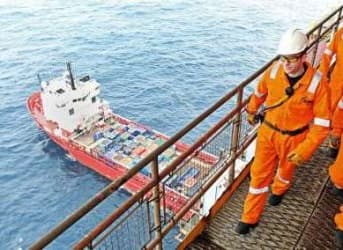Britain’s oil and gas industry is facing a crisis.
A new report from the Oil & Gas UK, an industry trade group, finds that investment in the region is falling precipitously. The North Sea is one of the more expensive places to produce oil and gas. The offshore fields have been producing for decades and many are mature and in decline. Companies must continue to put up cash just to keep production flat.
Oil & Gas UK says that after hitting £14.8 billion in 2014, capital spending in the North Sea could drop by £2-4 billion each year, for the next three years. And spending on exploring for new oil and gas reserves could be cut by more than two-thirds. “This is worrying for the UK. It will affect our ability to develop new projects,” the economic director of Oil & Gas UK, Mike Tholen, told the Financial Times in a recent interview. Related: OPEC Is Winning The Price War Says IEA
Just like other oil-producing regions around the world, low oil prices are taking a toll, forcing a contraction that could be hard to recover from.
The North Sea is already fading in terms of its importance to global oil markets. For instance, exploration companies only found an estimated 55 million barrels of oil equivalent (BOE) on average each year between 2012 and 2014, the worst three-year performance in the history of the British continental shelf. If the industry was having trouble finding new reserves when oil prices were well over $100 per barrel and investment was at a record high (the £14.8 billion in capital investment spent in 2014 was the highest on record…for the fourth successive year) their chances of significantly improving upon those results with severe spending cuts are essentially nil.
For the North Sea, the report does offer some silver-linings. The UK government cut taxes a bit earlier this year in an effort to make the contraction less severe. The government is also picking up the tab for seismic surveying, which could lead to exploration in new areas. Companies are pursuing cost savings (just like most other oil and gas firms around the world), and North Sea operators could achieve a 22 percent (or £2.1 billion) reduction in the cost of operations by the end of 2016, according to Oil & Gas UK. Related: Norway Has Nothing To Fear From Oil’s Downturn
The average cost of producing a barrel of oil equivalent is expected to fall from £17.80 in 2014 to £17 this year. As more savings kick in, that cost could fall further to £15 per BOE by 2016.
Moreover, four new oil fields came online in 2014. And Nexen’s Golden Eagle field started operation in October 2014 (peak production expected to be 70,000 barrels per day), which has actually contributed to a slight increase in oil production this year, the first increase in 15 years.
However, the good news pales in comparison to the bad. For example, the extent to which efficiency gains come from real cost improvements or simply from culling payroll is hard to discern. Collectively, British oil and gas companies have laid off more than 60,000 workers since the beginning of 2014, with employment falling by 15 percent to just 375,000 today. More layoffs could be in the offing.
Moreover, the slight uptick in production could be brief. These fields were developed when oil prices were high. There are still a few fields in the project pipeline, dating back to before the oil bust. But after the queue is cleared, there could be precious few new fields coming online, especially with companies dramatically scaling back spending. That points to a future of production declines. Related: BMW Going All-Electric
To make matters worse, decommissioning costs are rising. By 2018, the cost of decommissioning old fields will double from the 2014 total of £1 billion, as 50 fields are nearing their end of life. In fact, over the next five years, 140 fields may have to be decommissioned, many of which may still proceed even if oil prices rebound.
Decommissioning could create a “domino effect,” presenting parts of the North Sea with a “serious and urgent risk” of shutting down, according to the head of the Oil and Gas Authority. That is because companies often share the cost of maintaining pipelines and processing facilities. If one company pulls out of an area, that leaves the cost of maintaining infrastructure that much higher for the players that remain. More and more could decide operating in the North Sea is simply not worth it.
By Nick Cunningham of Oilprice.com
More Top Reads From Oilprice.com:
- Aussie PM Ousted As Commodities Pressure Proves Too Much
- OPEC Lowers Global Demand Growth Expectations For Oil In 2016
- Oil Price Increase Will Not Come Fast Enough To Save Alberta


















